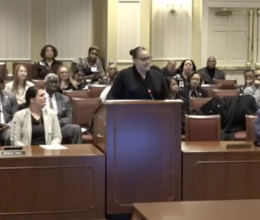
It's hard to believe, but as the Baltimore Sun recently reported, Ronald Hammond is serving 20 years in prison for possessing less than a quarter ounce of marijuana - an amount so small that it's no longer a criminal offense in Maryland - because his guilty plea to a 2012 marijuana possession charge violated the terms of a ridiculously harsh 2010 probation sentence for selling $40 worth of cocaine.
Ronald's case sums up so much of what is wrong with drug laws and mass incarceration in America. He had been working and supporting his girlfriend, who was seven months pregnant with their second child when he agreed to plead guilty in 2012 (without a lawyer) to the marijuana possession charge. Now, two years into the 20-year prison term imposed for violating probation, his young son asks about him all the time, and his baby girl doesn't know him.
How could this happen? It happens because of insanely punitive drug laws that enable judges to hand out 20-year sentences for selling trivial amount of drugs. It happens because some judges see nothing wrong with imposing a grotesquely harsh 20 year suspended sentence for selling $40 worth of cocaine, a sentence that a defendant may need to serve in full if he or she commits even a single technical infraction (like showing up late for an appointment) during the many years on probation. It happens because some prosecutors see nothing wrong with asking for such sentences. It happens because defendants would rather avoid prison time, so gamble that they can avoid violating probation. And it happens because even the smallest infraction, like possessing an amount of marijuana so small that it is no longer even a crime in Maryland, can violate the terms of probation, and allow a judge to order the defendant to serve the full suspended sentence. All of which happened to Ronald.
Because Ronald agreed, without the benefit of a lawyer's advice, to plead guilty and pay a fine when he was charged in 2012 with possessing a few grams of marijuana, the judge from his 2010 cocaine conviction decided he had violated his probation (by being convicted of another crime) and decided to make him serve the full 20-year prison sentence she had previously suspended. Ronald's public defender has now convinced a court to undo the guilty plea for the 2012 marijuana charge (because he was not represented at the time). But Ronald has already been sitting in prison for two years because of the guilty plea, and the State's Attorney may still seek to convict him on that charge, and may still seek to have him serve the full 20-year sentence for the probation violation.
This is what mass incarceration looks like: individuals being sentenced for long prison terms for using or selling tiny amounts of drugs; people with few resources taking plea deals because they need to get home and support their families - people like Ronald, whose children need him home.
This happens over and over - in fact, drug crimes are the single most frequent reason for being sent to state prison in Maryland. It needs to stop.
If we want to end the system of mass incarceration that needlessly and senselessly locks up huge segments of our population, then we need to change the legal structures that enable it. But in the meantime, prosecutors and judges at every level, and in every jurisdiction, must start now to dismantle this system by simply refusing to ask for or impose these kinds of sentences, which serve no legitimate purpose. And you can help make that happen ...







